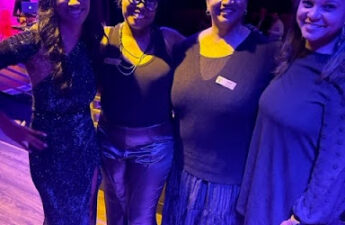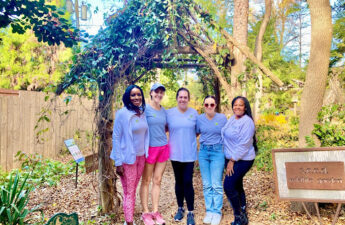On April 16, the Junior League of Charlotte, Inc. (JLC) asked more than 40 Mecklenburg County Public Officials to take action on two important issues: Food Deserts and Human Trafficking.
Speakers who presented at the JLC’s Annual Public Officials Breakfast were:
- Mary Keller Costa, JLC Advocacy & Public Awareness Committee Chair
- Robin Emmons, Sow Much Good Founder
- Jocelyn Roper, Reid Park Academy
- Emily Fitchpatrick, Hope House Programs Founder
- Kimberly Williams, JLC Public Policy Institute
- Whitni Wilson-Wertz, JLC President
At the event, Sow Much Good Founder Robin Emmons challenged officials with: “Is it possible to build an oasis in the desert?” She cited data that 73,000 residents of Mecklenburg County live in so-called food deserts, which are areas vapid of fresh fruit, vegetables and other healthful whole foods. Emmons discussed what can be done to solve this issue including the utilization of barren land for farming. She closed with: “Yes, it is possible to build an oasis in the desert.”
Emmons was followed by local science teacher Jocelyn Roper who heads the Reid Park Academy Community Garden – in essence an oasis for that community. This garden yields fresh produce and serves as a living classroom for K-5 children. The JLC has played a central role in the garden from its seeding – and the community as a whole is reaping the benefits.
The next pressing topic on the agenda was human trafficking. According to the National Center for Missing and Exploited Children, more than 100,000 children each year fall prey to sex trafficking. Equally staggering is the fact that North Carolina ranks among the top 10 states in the nation for calls to the National Human Trafficking Hotline operated by the Polaris Project.
Speaker and Hope House Programs’ Founder Emily Fitchpatrick outlined why this issue is so pervasive yet hard-to-address in society. For one, there is no consistent profile for victims – they are young and old; foreign and American; educated and non-educated. Fitchpatrick explained that really the only common thread is vulnerability – which is not outwardly recognizable in many cases and makes identifying victims of human trafficking highly challenging. She discussed the need for additional training for CMPD and other authorities to spot victims, along with the need for tailored services for human trafficking victims to ensure their mental, emotional and physical wounds are handled with proper care and attention.
Next, JLC Public Policy Institute Member Kimberly Williams demonstrated the Junior League’s staunch opposition to human trafficking, which has included the adoption of a formal position statement on the issue as well as a public stand to support Senate Bill 547 which created the NC Human Trafficking Commission. The Junior League continues to be dedicated to this issue and is supporting additional legislation aimed at increasing penalties for human trafficking perpetrators.
The event was closed by JLC President Whitni Wilson-Wertz who called upon the public officials to take action on the issues discussed. She noted that the Junior League of Charlotte, Inc. aims to create “links” and synergies across government, organizations and agencies to make lasting impacts in Mecklenburg County and the entire state of North Carolina. Tangible ways you can link hands to help the JLC address these prevalent issues are to help support the sustainable efforts that have been
undertaken to bring Hope House to the greater Charlotte area to support human trafficking survivors.
Find out how you can be part of the sustainable solutions achieved through urban farms. Just contact us at jlcadvocacy@gmail.com to link hands and make a difference.

